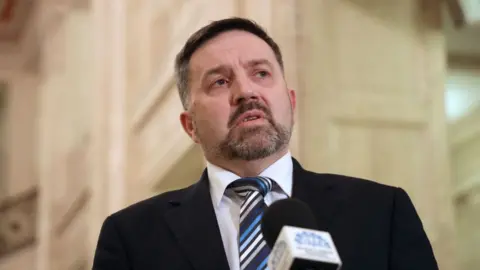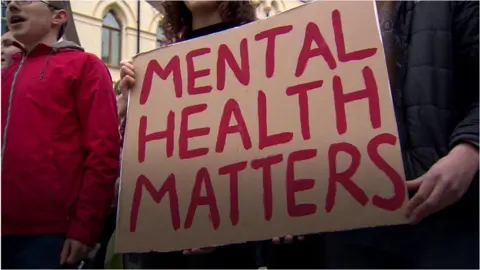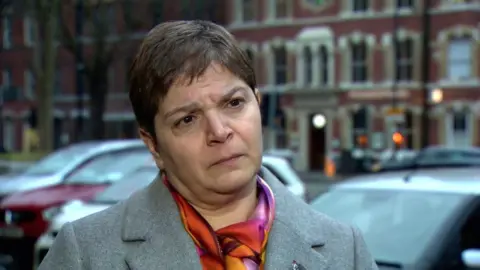Will a mental health champion make a difference in Northern Ireland?
Northern Ireland has the highest suicide rate in the UK.
Successive Stormont governments have grappled with concerns about mental health provision.
Health Minister Robin Swann announced last month he would appoint a mental health champion, to act as both a "government advocate" and "challenger of decisions".
Some groups support the creation of the new post; others questioned whether its holder will have sufficient powers and be independent.
What is the background to this?
Northern Ireland's mental health problem has been well-documented in recent years.
One Ulster University study said that almost 30% of the NI population suffer mental health problems, nearly half of which are directly related to the Troubles.
Statistics suggest that proportionally more people take their own lives in Northern Ireland than elsewhere in the UK: The suicide rate for men is about twice the level of that in England.
In January, dozens of high-profile figures signed a letter calling for Stormont to declare a public mental health emergency.
Speaking before the coronavirus crisis, Health Minister Robin Swann said suicide prevention was his top priority.
 PAcemaker
PAcemakerHe says a mental health champion would be "a strong, effective and independent voice to advocate for mental health".
The champion will also have a role to play in highlighting the importance of emotional wellbeing and mental health in the aftermath of the Covid-19 pandemic, says the health minister.
On Wednesday, he published a Mental Health Action Plan for Northern Ireland.
It contains 38 actions, including a commitment to produce a mental health strategy with which Mr Swann said the the mental health champion would play "an integral part".
What powers will the champion have?
The mental health champion will not be a formal public appointment, so will not have any powers based in legislation, instead making recommendations or lobbying for change.
"We didn't get the full extent of going to a commissioner for the post and that's because of the time it would take to get to legislation to create that post," said Mr Swann this week.
"What I wanted to do was move very quickly to get someone in post that would sit outside government, but could still hold us to account while we were still developing and working to a strategy."
How have people reacted?
Some local mental health groups have welcomed the creation of the post.
David Babington from Action Mental Health said that while details about the role were unclear, its creation was a positive step.
"There are acute, mental health needs in our communities requiring a unique solution and a champion with a dedicated focus will help achieve this," he said.
"The announcement heralds a much needed and long overdue investment to drive change and achieve parity with physical services."
Dr Gerry Lynch, chair of the Royal College of Psychiatrists NI, said: "We welcome with caution, the plans released for the appointment of a mental health champion.
"Such a champion could play a valuable role in ensuring that all areas of public life recognise the importance of taking effective steps to promote better mental health and inclusivity for those with mental illness."
But others have voiced concerns.
Sara Boyce, of the community group Participation and the Practice of Rights (PPR), said the role's creation was "misguided and a misdirection of previous public resources".
"PPR works with families bereaved by suicide and with people who struggle with their mental health," she said.
"Our society already has mental health champions in all of these people.
"Listening to their ideas to ensure timely and effective access to services - and urgently implementing these - should be the first port of call for the minister during this period."

Michael and Marjorie Cawdery, from County Armagh, were killed in their home in April 2017 by a man with severe mental health issues.
Their son-in-law, Charles Little, was the first person to arrive at the scene of their deaths.
He said: "There are days you just wanted to sit down and cry because it had a tremendous impact on my family's mental health.
"But we had to fight to get help and so, if there is going to be a mental health champion they need to be given powers and most importantly be independent, but that doesn't seem to be what the health minister is proposing."

Mr Little added: "The minister has said the champion will be a public advocate for mental health and government advocate to support the department, how can you be both? It's a conflict of interest."
Philip McTaggart's son died in 2003 and he has spent years working with bereaved families, through the organisation Prevention of Suicide and Self-Harm (PIPS).
He said: "I understand the pressure the department of health and the minister is under at the minute, but my concern is that this role of mental health champion is more about the optics than actually making changes.
"On the face of it, this champion will be able to offer advice without any real powers to change policy.
"The money would be better spent in bolstering mental health services already in place."
What about similar roles?
In recent weeks, there have been announcements about a recruitment campaign for a Northern Ireland Veterans' Commissioner as well as a walking and cycling champion.
But the creation of these roles are still in the early stages.
Examples of positions in Northern Ireland that are public appointments and have statutory powers include the Children's Commissioner and the Northern Ireland Public Service Ombudsman.

The Children's Commissioner has voiced concerns about the mental health champion role.
"I'm not convinced we need a mental health champion, goodness knows there have been countless reports outlining where the gaps in our mental health services are," Koulla Yiasouma told BBC News NI,
"I'm not sure what more that role could add to the conversation right now."
She added: "I don't feel this is me being protectionist about the work of my office, but I think there is the danger of crossover and duplication with a mental champion role and there are already areas identified where we could be investing that money to make a difference."
What happens now?
The Department of Health says further details on the scope of the role and the appointment process will be made available within weeks.
The department estimates it will cost up to £500,000 a year to run the champion's office, with the cost being share by all Stormont departments.
The champion is expected to be in post by February.
